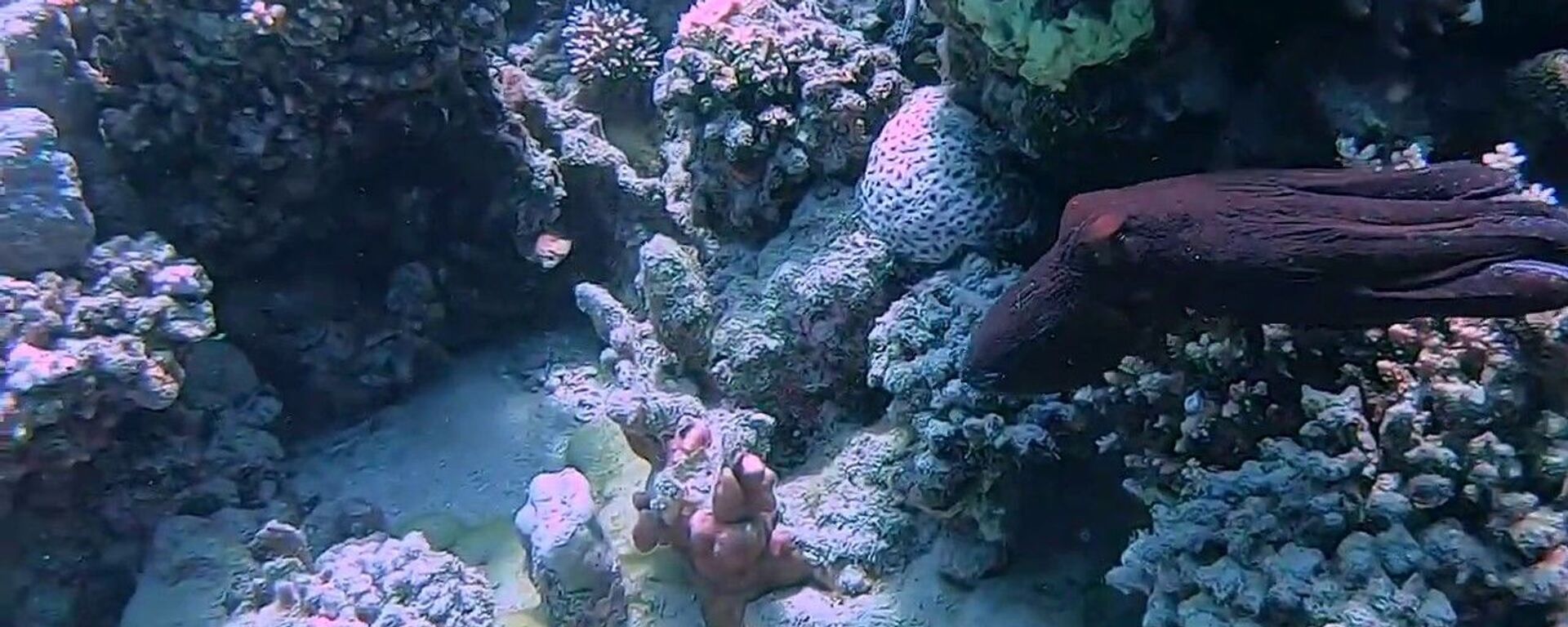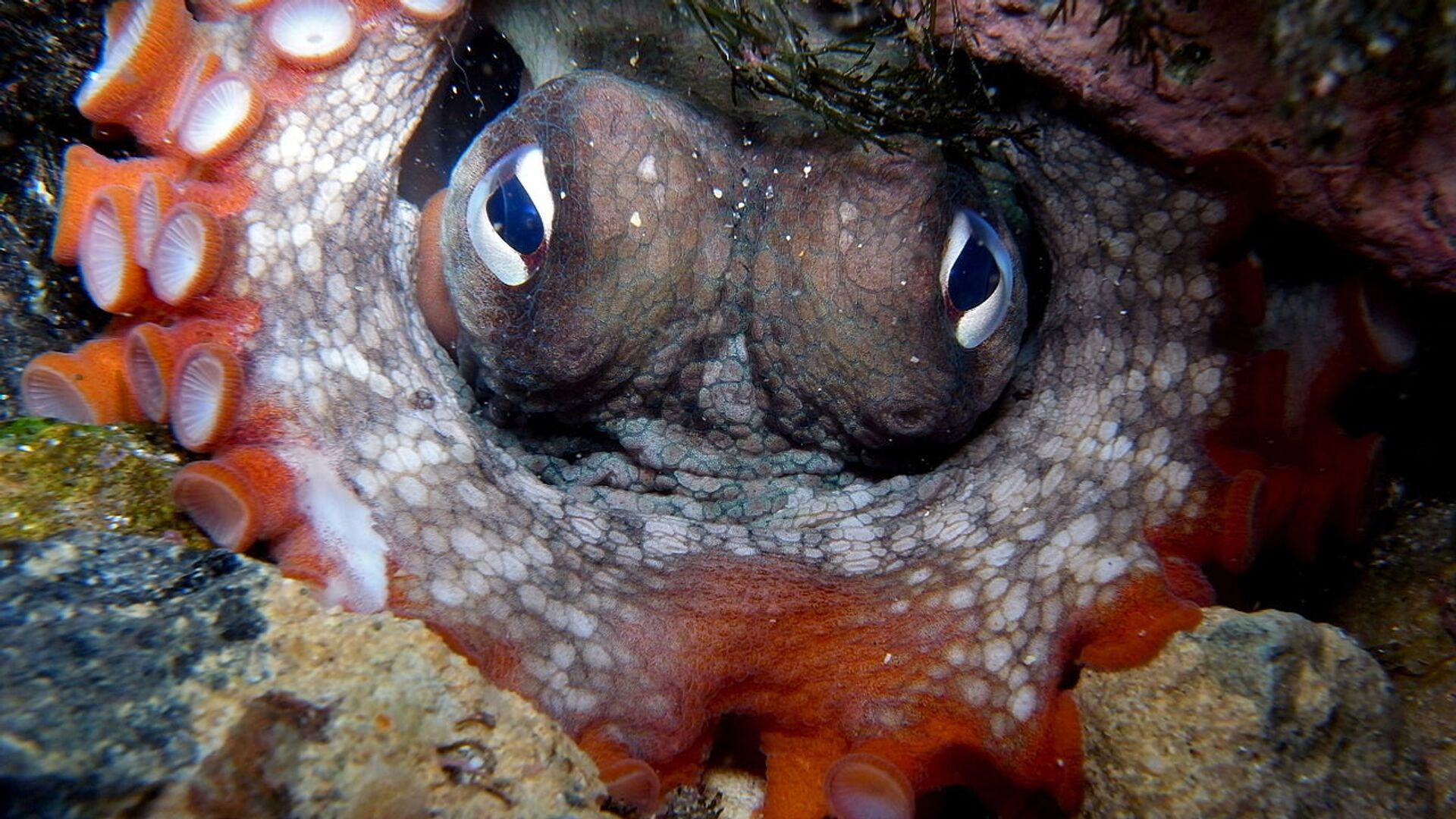https://sputnikglobe.com/20230526/just-like-us-octopuses-have-nightmares-too-new-study-suggests-1110599586.html
Just Like Us? Octopuses Have Nightmares Too, New Study Suggests
Just Like Us? Octopuses Have Nightmares Too, New Study Suggests
Sputnik International
The survey was conducted by a team of New York-based scientists, who were flabbergasted by abnormal behavior by a captive male octopus named Costello.
2023-05-26T10:26+0000
2023-05-26T10:26+0000
2023-05-26T10:33+0000
beyond politics
us
new york city
scientists
study
octopus
nightmare
https://cdn1.img.sputnikglobe.com/img/105751/02/1057510271_0:120:1280:840_1920x0_80_0_0_e8825b7d08dcda7e15822483bce84613.jpg
Octopuses may have both good and bad dreams, just like humans do, a new study has claimed.In the survey, which has yet to be peer-reviewed, scientists from New York City's Rockefeller University documented behavior by a captive male Brazilian reef octopus that that they say looks very similar to a nightmare.Some parts of the footage, though, showed Costello waking up with a start and then flinging his arms around and squirting out ink, the same as he would do in the wild when trying to escape a predator, according to the scientists.The researches added that they “speculate that the complex behavioral sequences displayed in these episodes suggest octopuses experience parasomnias which may include nightmares with the potential to disrupt their sleep.”It remains unclear whether such behavior affects all octopuses, given that the study only looked into the one cephalopod. The Rockefeller team, for their part, expressed hope that reporting the incident would prod other scientists to keep an eagle's eye on the octopuses’ behavior to confirm the findings.
https://sputnikglobe.com/20221126/study-human-and-octopus-brains-turn-out-to-be-surprisingly-similar-1104719874.html
new york city
Sputnik International
feedback@sputniknews.com
+74956456601
MIA „Rossiya Segodnya“
2023
Oleg Burunov
https://cdn1.img.sputnikglobe.com/img/07e4/09/0b/1080424846_0:0:2048:2048_100x100_80_0_0_3d7b461f8a98586fa3fe739930816aea.jpg
Oleg Burunov
https://cdn1.img.sputnikglobe.com/img/07e4/09/0b/1080424846_0:0:2048:2048_100x100_80_0_0_3d7b461f8a98586fa3fe739930816aea.jpg
News
en_EN
Sputnik International
feedback@sputniknews.com
+74956456601
MIA „Rossiya Segodnya“
Sputnik International
feedback@sputniknews.com
+74956456601
MIA „Rossiya Segodnya“
Oleg Burunov
https://cdn1.img.sputnikglobe.com/img/07e4/09/0b/1080424846_0:0:2048:2048_100x100_80_0_0_3d7b461f8a98586fa3fe739930816aea.jpg
octopus named costello, team of scientists, a scientific study's suggestion octopuses have nightmares
octopus named costello, team of scientists, a scientific study's suggestion octopuses have nightmares
Just Like Us? Octopuses Have Nightmares Too, New Study Suggests
10:26 GMT 26.05.2023 (Updated: 10:33 GMT 26.05.2023) The survey was conducted by a team of New York-based scientists, who were flabbergasted by the abnormal behavior of a captive male octopus named Costello.
Octopuses may have both good and bad dreams, just like humans do, a new study has claimed.
In the survey, which has yet to be peer-reviewed, scientists from New York City's Rockefeller University documented behavior by a captive male Brazilian reef octopus that that they say looks very similar to a nightmare.
Reviewing the footage of the cephalopod named Costello, researchers noticed that the animal often changed colors and patterns as he slept, which prompted them to believe that he was “dreaming and physically reflecting the contents of its dream through its body language.”
Some parts of the footage, though, showed Costello waking up with a start and then flinging his arms around and squirting out ink, the same as he would do in the wild when trying to escape a predator, according to the scientists.
"The behavioral sequences displayed by this octopus upon emerging from disturbed sleep were similar to behavioral responses to nightmares, night terrors, and other parasomnias in humans, with a narrative structure resembling waking defense behaviors in octopuses," the study pointed out.
The researches added that they “speculate that the complex behavioral sequences displayed in these episodes suggest octopuses experience parasomnias which may include nightmares with the potential to disrupt their sleep.”

26 November 2022, 10:34 GMT
It remains unclear whether such behavior affects all octopuses, given that the study only looked into the one cephalopod. The Rockefeller team, for their part, expressed hope that reporting the incident would prod other scientists to keep an eagle's eye on
the octopuses’ behavior to confirm the findings.




